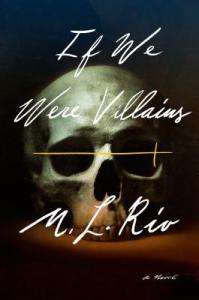
Book Cover Image: If We Were Villains by M. L. Rio
" data-orig-size="265,400" sizes="(max-width: 199px) 100vw, 199px" aperture="aperture" />BOTTOM LINE: A fascinating story
Genre: Psychological Suspense
Publication Date: 11 April 2017
Source: Publisher via NetGalley
Synopsis from the Publisher:
“Oliver Marks has just served ten years in jail – for a murder he may or may not have committed. On the day he’s released, he’s greeted by the man who put him in prison. Detective Colborne is retiring, but before he does, he wants to know what really happened a decade ago.
As one of seven young actors studying Shakespeare at an elite arts college, Oliver and his friends play the same roles onstage and off: hero, villain, tyrant, temptress, ingénue, extra. But when the casting changes, and the secondary characters usurp the stars, the plays spill dangerously over into life, and one of them is found dead. The rest face their greatest acting challenge yet: convincing the police, and themselves, that they are blameless.
Intelligent, thrilling, and richly detailed, If We Were Villains is a captivating story of the enduring power and passion of words.”
My Thoughts: If one were to take a boarding school story, throw in a mysterious death, add to it the psychology of guilt, and top it off with a lot of Shakespeare, you get something like If We Were Villains. The story starts at the end, upon the main character’s release from prison, where he spent the last ten years for a murder charge. However, who the victim was and the motivation for the crime remain a mystery. The rest of the story, minus introductory sections between each act, is one big flashback, as Oliver reflects on his senior year at the college, his friends and rivals, and the events that brought him to prison.
While it is a decent murder mystery, If We Were Villains is almost better as an homage to Shakespeare. Ms. Rio structures the book as one of Shakespeare’s plays, the characters are deep into their final year of performing nothing but his plays, and they speak to each other using Shakespeare’s dialog as their own. Everything Oliver and his friends do and say oozes Shakespeare. While one does not technically need to be a Shakespearean expert to enjoy the novel, any prior knowledge about his plays and their general structure will improve one’s enjoyment of the novel. Along the same lines, while understanding the quotes is not necessary to understand the story, being familiar with the dialog and being able to interpret it will improve one’s understanding of key scenes. Ms. Rio often uses the context of the plays as enacted by the characters to build the emotional context of her story. The text is too closely intertwined with Shakespeare to be able to ignore those sections completely.
When I first started writing this review, I kept thinking of the introduction for the 1990s MTV show The Real World: “This is the true story, of seven strangers, picked to live in a house, work together, and have their lives taped. Find out what happens, when people stop being polite, and start getting real.” If We Were Villains is The Real World but when these strangers live and work together for four years rather than a few months. Just like in the TV show, tensions rise, sides are chosen, people take on various roles as required by any group of people. However, to discount the strain of acting upon the seven is to ignore a key stressor in their lives. Because they are together all the time, they forget where their emotions end and the emotions of their characters begin. The lines between the real world and the acting world blur and therein lies the conflict.
In a novel full of pretension and superiority complexes, it would be easy to dismiss Oliver and his friends as nothing more than spoiled college kids who have no understanding of the real world. In some ways, this is very true. They are complete in their isolation. The town in which the college resides is small, and the college itself accepts a small number of students. In addition, there is little interaction among the various arts disciplines outside of meal times and parties. Then, for Oliver and his friends, they are staying in a residence hall that is well-removed from the rest of the campus and surrounded by woods. They have almost no contact with the outside world and even find themselves removed from their fellow classmates. Yet it would be difficult to say that they have no understanding of the real world. Their obsession with the Bard affords them a better understanding of the human mind than most of their contemporaries. Through rigorous tutelage of Shakespeare, his words and the emotions they evoke, the historical context, and the like, they understand better than other college students and most adults man’s capacity for drama and man’s ability to be swept up by emotions. This should make them less susceptible to falling prey to those same emotions. However, emotions rule all Shakespeare plays, and in this way, If We Were Villains mirrors Shakespeare.
If We Were Villains is so much more than a murder mystery. It explores human nature and the fine lines that separate all emotions. It is reality television for the literary mind, with its closed set and closed cast. Moreover, it is a love note to Shakespeare and his co-authors, for the plays that capture the essence of human emotion and the words which do more to express that emotion more than anything written to date. While not for everyone, it is a worthy story that is immensely readable and exciting.
